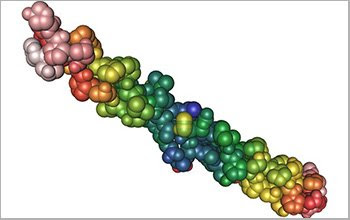Conventional treatments for diabetes can increase the risk of neurological problems, an under-researched side effect. U.S. National Science Foundation-supported scientists based at The Ohio State University developed a nanomaterial that binds insulin to a group of amino acids that includes antioxidants. The nanomaterial improved glucose consumption, leading to better brain function. When compared to mice...
Tag: <span>nanomaterial</span>
Post
Chemists invent shape-shifting nanomaterial
Chemists have developed a nanomaterial they can trigger to shape-shift — from flat sheets to tubes and back to sheets again — in a controllable fashion. The Journal of the American Chemical Society published a description of the nanomaterial, which was developed at Emory University and holds the potential for a range of biomedical applications, from controlled-release drug delivery...

